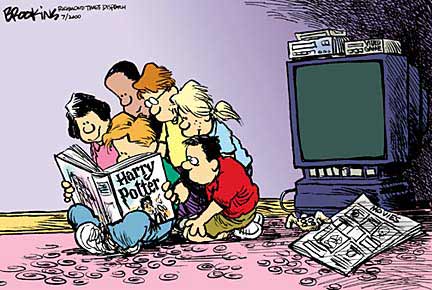Thursday, December 15, 2005
Narnia and Polly and Glen Waddell
I just read Polly Toynbee's review of the new Narnia movie. It was somewhat similar to other reviews I've recently read.Apparently, reviewers who are not familiar with the books are being taken by surprise. Shouldn't there be some kind of IQ requirement? Shouldn't there be some kind of rule that before a critic is allowed to review a movie based on a book, that critic must first read the book?
On second thought, why should that be a rule? Isn't it just common sense? Wouldn't it be a sign of, oh, say, asininity, to set oneself up as some kind of expert about a movie based on a book, if one has not yet read the book?
This woman states that the movie is very faithful to the book, even though she never mentions that she has read it, and then proceeds to tear it to pieces because of her fear that it might give children cause to think about and recognize Christianity later in their lives. She advises non-believers to take a sickbag to the theater.
Oh Polly, Polly, Polly. . . . regardless of what you think, or what anyone thinks, your review falls into the same category as any other review: opinion.
In other words, your review, like any review, contains very little fact; it contains only your slant on your personal interpretation of a studio's slant on their personal interpretation of a very good book. (MY slant and personal interpretation.)
Is mine any better than yours? No. I know many people who found fault with the film. But I run with a crowd that loves finding fault with book-based movies, because we are first and foremost book lovers, and we hate it when a movie leaves things out.
I'm not complaining about you having an opinion that's different than mine. Heck, that's what this country is all about! It would be pretty boring if we all thought alike.
Perhaps, however, if we all stopped putting each other and things down because of those differences, we might all get along somewhat better than we do now. I need to take this advice as much as you do.
Why can't a reviewer acknowledge the Biblical allegory, accept it without whining, praise the wit and cleverness and subtlety or non-subtlety of it, and move on? Why is it that anything 'religious' is an open invitation to harsher criticism than, say, something "trashy" or "immoral" or "violent?" Why is a movie about child molesters 'artistic' and 'touching,' while a movie with religious implications is 'propaganda?' Why do we refer to an abuser as 'handsome yet monstrous' and say things like 'I couldn't help liking him a lot anyway,' but to mention anything religious as being 'good for us' is out of line? Why would a movie like this be called "a fine piece of filmmaking, and something any true film lover should see," while a movie like Narnia is ". . .heavily laden with guilt, blame, sacrifice and a suffering that is dark with emotional sadism"?
Whether you like it or not, this country uses a lot of Biblical references and allegories in everyday life. You've acknowledged that in your article. This country also uses a lot of mythological references and allegories in everyday life. You don't seem to mind that. This country uses all KINDS of references and allegories, in every possible category and genre, in everyday life. People who understand them are considered educated and probably more intelligent than people who don't understand them. What's up with that little difference in your personal slant?
What, you didn't understand all the allegories? I rest my case.


 Hitting the fan like no one else can. . .
Hitting the fan like no one else can. . .






























